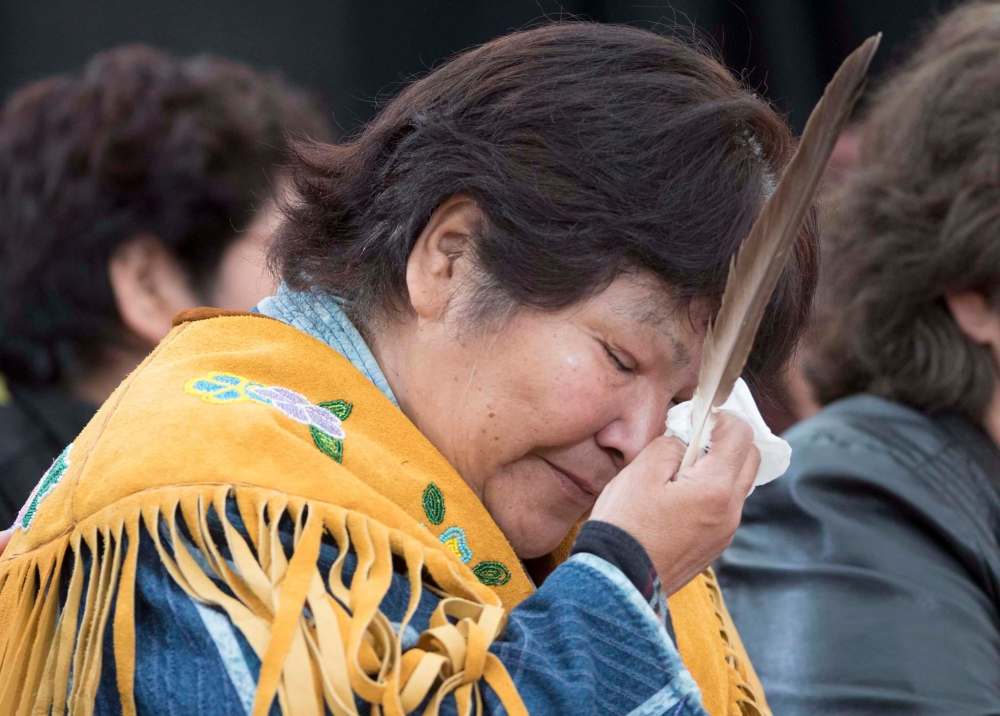MMIW inquiry a matter of life and death
Advertisement
Read this article for free:
or
Already have an account? Log in here »
To continue reading, please subscribe:
Monthly Digital Subscription
$0 for the first 4 weeks*
- Enjoy unlimited reading on winnipegfreepress.com
- Read the E-Edition, our digital replica newspaper
- Access News Break, our award-winning app
- Play interactive puzzles
*No charge for 4 weeks then price increases to the regular rate of $19.00 plus GST every four weeks. Offer available to new and qualified returning subscribers only. Cancel any time.
Monthly Digital Subscription
$4.75/week*
- Enjoy unlimited reading on winnipegfreepress.com
- Read the E-Edition, our digital replica newspaper
- Access News Break, our award-winning app
- Play interactive puzzles
*Billed as $19 plus GST every four weeks. Cancel any time.
To continue reading, please subscribe:
Add Free Press access to your Brandon Sun subscription for only an additional
$1 for the first 4 weeks*
*Your next subscription payment will increase by $1.00 and you will be charged $16.99 plus GST for four weeks. After four weeks, your payment will increase to $23.99 plus GST every four weeks.
Read unlimited articles for free today:
or
Already have an account? Log in here »
Hey there, time traveller!
This article was published 07/06/2017 (3111 days ago), so information in it may no longer be current.
The discovery of the remains of a young indigenous woman in a field east of Winnipeg reminds us, once again, of the critical importance of the National Inquiry into Missing and Murdered Indigenous Women and Girls, which began public hearings last week in Whitehorse.
As we watch the inquiry do its work — which between now and 2018 will involve examining potentially thousands of individual cases — it’s important to remember that in each instance, the victims are more than just statistics.
Christine Wood was loved by family and friends in her home in Oxford House and, at 21 years old, should have had a long future to follow her ambitions. Instead, she went missing on Aug. 19 in Winnipeg, where she had gone to visit relatives. A 33-year-old man has been criminally charged in connection with her death.

As Wood’s case unfolds, we are reminded of how sensitive and complicated these matters are, both for the families of the victims and for Canadian society.
The inquiry that started public hearings in the Yukon heard testimonies from several family members who lost loved ones, and now will take the summer off before resuming hearings that will continue across the country until the end of 2018.
Even before its work started, the inquiry was criticized by indigenous leaders and the families of the missing and murdered women, who say it’s still not clear when they will get a chance to share their testimony.
They are deeply concerned about a lack of communication and that the inquiry’s time frame may be too short.
The criticisms should be heeded. Clear communication with the families should be a priority as the inquiry strives to build relationships of trust, and the inquiry should be given adequate funding to continue as long as it needs to fulfil its mandate.
It is essential that the inquiry answer, on behalf of all Canadians, some fundamental questions. Why are indigenous women and girls so victimized by violence? Why are they so often the subjects of “unsolved” crimes? Why are they missing and murdered in numbers disproportionate to other Canadians?
The inquiry doesn’t have authority to award financial compensation to families, but it has the potential to educate the public and restore public confidence in institutions, such as police forces, whose credibility has been seriously damaged in the eyes of many Canadians.
Part of the inquiry’s mandate is “to make recommendations for action and policy reform aimed at effecting real changes to make Indigenous women and girls safe, sacred, honored and empowered.”
It is important that, at some point in the future, indigenous women and girls in Canada feel genuinely safe, honoured and empowered. The inquiry, which will cross the country to speak to the people most affected by this epidemic of violence, could be the start of a process that leads us all to that outcome.
Until that day comes, Christine Wood reminds us that the inquiry is a matter of life and death.


